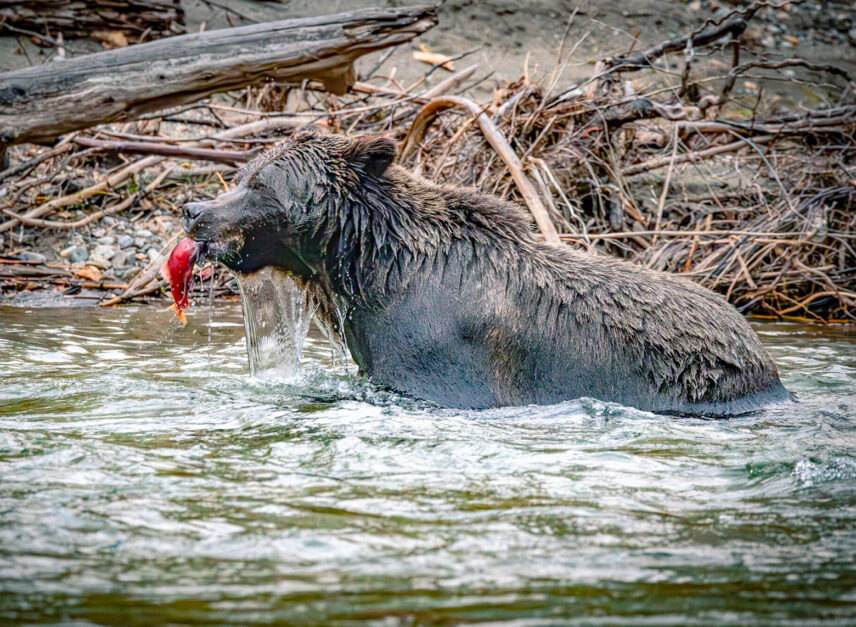Excerpt from the article “Meeting Grizzlies in British Columbia” in the Financial Times.
I really wanted to be here. But now that I was, I would rather have been anywhere else. I was deep inside ancient woodland. It was almost dark. In the gloaming, the gnarled trunks of vast red cedars, some more than 1,000 years old, had started to look like gargoyles, malign forest deities. All around were thickets of hemlock and willow. “They sleep in them during the day,” whispered Sage Raymond, my 23-year-old guide. “But they’ll be awake now. This is the time they hunt.”
We came across an explosion of bones. Elk, Sage said. And then scat, luridly purple with huckleberries, next to which was a set of fresh prints in the mud, each the size of a dinner plate, with five Freddy Krueger-esque claw marks extending outwards. Big grizzly, said Sage. We crept on, noiselessly, deeper into the forest. Ravens, those harbingers of ill fortune, mockingly caw-cawed us from the branches above.
From a tangle of dogwood, there came a rustle. Sage felt for the can of pepper spray on her belt. The rustle became a crash, and then an eruption of noise, hissing and drumming, the sound of a heavy, charging animal, and coming straight at us. It burst out: a ruffed grouse. “We call that the heart-attack bird,” laughed Sage. It was almost the last thing I ever heard.
I was in the Central Selkirk Mountains, southern British Columbia, a 450-mile drive inland from Vancouver. I was staying at the Wild Bear Lodge, six wooden cabins by the foaming Lardeau river at the bottom of a steep valley, about an hour’s drive from Kaslo, the nearest small town.
The six cabins of the Wild Bear Lodge by the Lardeau river, about an hour’s drive from the nearest town Kaslo.
It was here in 2005 that Briton Julius Strauss, 52, and his Estonian wife, Kristin, 43, had first pitched up. Julius had spent years working as a war correspondent for a British newspaper, covering bloody conflicts in Afghanistan, Iraq and Sierra Leone. After reporting from the Beslan school siege in Russia in 2004, where more than 330 people died, including 186 children, Julius had taken time out, suffering from PTSD and on antidepressants.
While driving across Canada, the couple had found this remote spot, teeming with grizzlies, and decided to buy the property. Needing to earn a living, Julius had trained as a bear guide — the first fully qualified bear guide in Interior British Columbia — still spending his days among lethal predators, but these ones armed with razor-sharp claws, not AK-47s.
The day after my near heart failure, I went out again, this time with Julius, climbing high through the spruce and the larch, stopping to retrieve the memory cards from camera traps. Julius popped one into his tablet to see what had been through. On the film, cougars and coyotes padded past, and one immense gangly moose with a candelabrum of antlers on its head. And then a big grizzly, a female, followed by three cubs, two staying close to mum, the third always straying off into the brush before being called back with a huff from its mother.
The bear stopped opposite the camera at a rubbing tree, where grizzlies leave scent trails to communicate with other bears, stood on her hind legs so she was 7ft tall, and shook her entire booty with such gleeful abandon that she looked like a drunken aunt dancing to Beyoncé at a wedding.
We climbed higher, into the snow, and a superhighway of animal tracks. Julius pointed out wolves and snowshoe hares and, of course, bears. From the prints he could tell how big the animals were, in which direction they were heading, even at what speed they were moving, thus indicating flight or pursuit.
Read more on The Grizzly Bear Dairies Substack.
For the full article, visit the Financial Times’ website.
